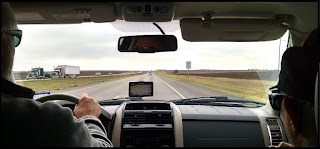Whitney is a small
town in Hill County was named after, surprisingly enough, Charles A. Whitney. Although
it
is near Lake Whitney, that’s not why the town appeared in its location. We
took a ride out to Whitney just to get out of the city and to see if the trees
had begun to reflect the change from summer to autumn. We were, of course, also
looking for somewhere new for lunch.
Back in 1876 the Houston and Texas Central Railroad built a line through Hill County to Cleburne; that was the beginning of Whitney. The railroad
purchased land from I. E. Griffith, C. C. Hicks, and
Lewis Raborn that was originally part of the Sterling Robertson grant. Standing
on a wagon that marked the site of the future train depot, an auctioneer sold
town lots. Rather quickly local merchants set up temporary storefronts, drawing
dealers from nearby communities who anticipated the rapid growth of the
community. Permanent buildings were erected drawing even more people, as well
as a post office. The land around the railroad was used for farming, but crops
failed in 1880 leaving people without food. The railroad stepped in and brought
carloads of corn for food as well as to restore the farming. Two years later,
Whitney produced 22,000 bales of cotton (this crop, apparently, was more
profitable than the corn crops).
Whitney continued to grow, establishing banks, schools, churches, and a
newspaper. However, after 1883 the population began to
decline. To combat this, the people of the community decided to have a picnic,
inviting people from all around the state. The speeches, sporting events,
entertainment, and more than a ton of barbecue made the event a success. Nearly
1000 people moved to the area, boosting the population and bringing commerce
back to the city. This boom lasted until about 1915 when the population began
to decline, again. But it wasn’t until 1944 that Whitney began to grow once
more.
The Whitney Dam and Reservoir Project required a bond election to raise taxes for improvement of city services. Two years later, the project began
attracting workers, and businesses.
One of these new businesses was the Blue Chip Ice Company that was built to provide
ice for the building of the dam; the cement mix required ice in the summer.
Lake Whitney was both a benefit and a detriment to the community. Once the lake
was inundated, farm land was reduced by 15,800 acres, making the profitability
of farming less likely. However, the lake attracted tourists and their dollars.
Although ranching still is popular in the area, Whitney has become a
‘bedroom community’ within easy commuting distance to Hillsboro
and Cleburne; it’s a bit farther to Waco. The population has increased to more
than 2,000 people, and the town boasts about 200 businesses. Tourism is still
big business with Whitney labeled as the ‘Getaway
Capital of Texas’, attracting folks interested in fishing, camping, and
boating. There are several restaurants and places to stay. We didn’t spend the
night, but we did sample some of the local cuisine. For information about my
rating system, see Reading the
Reviews.
The Texas Great Country Café and Pie Pantry (903 S Bosque St, Whitney, TX 76692, 254-694-3608) is billed as an ‘Unassuming American eatery serving breakfast, sandwiches, classic mains and homemade
pies’. And this is very accurate. What it doesn’t
say is that what appears to be a tiny restaurant in a strip shopping center
actually takes up most of the strip; there are three seating areas plus the
area for the pie pantry. The waitresses are efficient, friendly, and can be
silly (which we really liked). The food is good; the servings are large and the
prices are good. Dave had the chicken fried steak; there was more meat than
breading and the breading was well spiced rather than being doughy. The
vegetables were fresh and well prepared. Vince ordered the lunch special; this
day it was beef stroganoff. Although this is a fairly unusual dish for a
country restaurant, he said it was tasty and exactly what he wanted. I had an
open-faced beef sandwich. Of course it came with mashed potatoes, and I asked
that my second side be fried okra; it was a good decision. Dave and Vince got
okra, also; I was pleased not to have to share mine. We also got a basket of
rolls. The cornbread, that was quite good, was in the shape of Texas. Unfortunately, we were all too full to order
pie – but next time, we will! This place made us all smile.
©2017 NearNormal Design and Production Studio - All rights including copyright of photographs and designs, as well as intellectual rights are reserved.
 |
| Dave and Vince, on the road |
Back in 1876 the Houston and Texas Central Railroad built a line through Hill County to Cleburne; that was the beginning of Whitney. The railroad
 |
| Farm |
Whitney continued to grow, establishing banks, schools, churches, and a
 |
| Historic house |
The Whitney Dam and Reservoir Project required a bond election to raise taxes for improvement of city services. Two years later, the project began
 |
| Presbyterian Church |
Although ranching still is popular in the area, Whitney has become a
 |
| Boutique and Masonic Lodge |
 |
| Four carrots |
The Texas Great Country Café and Pie Pantry (903 S Bosque St, Whitney, TX 76692, 254-694-3608) is billed as an ‘Unassuming American eatery serving breakfast, sandwiches, classic mains and homemade
 |
| Top L to R: Cornbread, Beef stroganoff, Restaurant Bottom L to R: Beef sandwich, Chicken fried steak |
 |
| Old road |
©2017 NearNormal Design and Production Studio - All rights including copyright of photographs and designs, as well as intellectual rights are reserved.
No comments:
Post a Comment